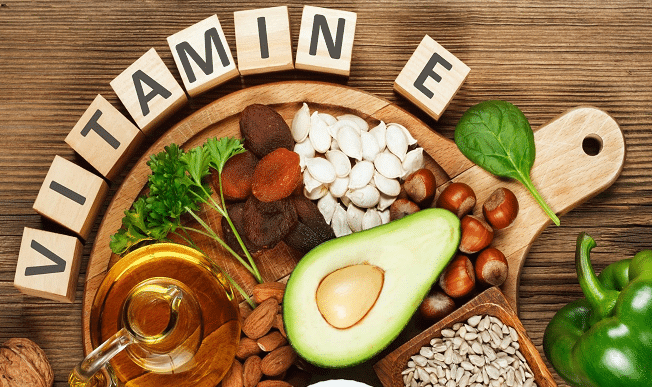wellhealthorganic.com:vitamin-e-health-benefits-and-nutritional-sources

Introduction to Vitamin E
Vitamin E is a crucial nutrient known for its powerful antioxidant properties, playing a vital role in protecting the body from the damaging effects of free radicals. This fat-soluble vitamin is key to maintaining healthy skin, eyes, and immune function, as well as preventing oxidative stress in the body’s cells.
The Science of Vitamin E
Vitamin E refers to a group of eight different compounds, the most active of which is alpha-tocopherol. Found naturally in a variety of foods, this vitamin is best known for its role in cellular protection and its antioxidant capabilities.
Major Health Benefits of Vitamin E
Antioxidant Properties of Vitamin E
As an antioxidant, Vitamin E helps neutralize free radicals, which are unstable molecules that can damage cells and contribute to cardiovascular disease and cancer.
Vitamin E and Skin Health
Vitamin E is widely recognized for its benefits to skin health. It helps in repairing damaged skin, improving skin hydration, and protecting the skin from aging and the effects of UV exposure.
Vitamin E and Heart Disease Prevention
Studies suggest that Vitamin E can prevent or delay coronary heart disease by limiting the oxidation of LDL-cholesterol, which is a major factor in the development of atherosclerosis.
The Role of Vitamin E in Immune Function
Vitamin E is essential for maintaining a healthy immune system, especially among older adults. It enhances the body’s ability to fight off infections and invading pathogens.
Vitamin E and Eye Health
Vitamin E plays a significant role in preventing the progression of age-related macular degeneration (AMD) and cataracts, two common causes of vision impairment and blindness.
Cognitive Benefits and Neuroprotective Effects
Research indicates that Vitamin E may help prevent or slow the progression of diseases like Alzheimer’s by protecting the brain from oxidative stress.
Dietary Sources of Vitamin E
Natural Sources of Vitamin E
The best natural sources of Vitamin E include nuts like almonds and peanuts, seeds like sunflower seeds, and green leafy vegetables such as spinach and broccoli.
Best Foods Rich in Vitamin E
Aside from the above, fruits like avocados and kiwi, as well as vegetable oils like wheat germ, sunflower, and safflower oil, are rich in Vitamin E.
Vitamin E in Supplements: Pros and Cons
While supplements can help prevent deficiencies, they should be taken with caution as high doses might lead to adverse effects like bleeding risks.
Read also wellhealthorganic.com:lemon-juice-know-home-remedies-easily-remove-dark-spots
Vitamin E Deficiency
Signs and Symptoms of Deficiency
Vitamin E deficiency is rare but can cause nerve and muscle damage, resulting in weakness and vision problems.
Populations at Risk of Vitamin E Deficiency
Individuals with fat-malabsorption disorders and those on very low-fat diets may be at risk.
Managing and Preventing Vitamin E Deficiency
A balanced diet rich in various sources of Vitamin E is typically sufficient to prevent deficiencies.
Vitamin E and Chronic Diseases
Vitamin E in the Prevention and Management of Diabetes
Vitamin E may improve glycemic control and protect against diabetes-related complications.
The Impact of Vitamin E on Alzheimer’s Disease
Regular intake of Vitamin E might slow functional decline in people with mild to moderate Alzheimer’s disease.
Vitamin E and Cancer Prevention
Although research is mixed, some studies suggest Vitamin E may play a role in cancer prevention, especially prostate cancer.
Optimal Vitamin E Intake
Recommended Dietary Allowances (RDAs) for Vitamin E
The RDA for adults is 15 milligrams of alpha-tocopherol per day.
Factors Influencing Vitamin E Requirements
Individual needs may vary based on age, diet, and health conditions.
Overconsumption: Risks and Effects
High doses of Vitamin E may increase the risk of hemorrhage and interrupt blood coagulation
Read also wellhealthorganic.com skin care tips in hindi.
Vitamin E in Different Populations
Vitamin E Needs in Infants and Children
Children require lower amounts of Vitamin E compared to adults, important for immune function and cell communication.
Vitamin E and Women’s Health: Pregnancy and Beyond
During pregnancy, adequate Vitamin E is crucial for fetal development but must be monitored to avoid excess.
Vitamin E for Aging Populations
Older adults may benefit from slightly increased intakes to combat age-related oxidative stress.
Emerging Research on Vitamin E
Recent Studies on Vitamin E and Health
Ongoing research continues to explore Vitamin E’s potential effects on health beyond its known benefits.
Future Directions in Vitamin E Research
Emerging research focuses on Vitamin E’s role in chronic disease prevention and management.
Practical Tips for Incorporating Vitamin E into Your Diet
Easy Recipes Rich in Vitamin E
Simple daily meals can be enhanced with Vitamin E-rich foods for improved health.
Tips for Enhancing Vitamin E Absorption
Consuming Vitamin E with fat-containing foods increases its absorption due to its fat-soluble nature.
Misconceptions and Myths About Vitamin E
Debunking Common Myths
Vitamin E is sometimes misunderstood; not all claims about its benefits are supported by scientific evidence.
What Science Really Says About Vitamin E
It’s essential to rely on scientific data rather than anecdotal evidence when considering the benefits of Vitamin E.
Vitamin E Supplements
Choosing the Right Vitamin E Supplement
It’s important to choose supplements from reputable sources and consult healthcare providers.
How to Read Labels on Vitamin E Supplements
Understanding the different forms of Vitamin E and their potencies can help in making informed decisions.
Interactions and Side Effects
High doses of Vitamin E can interact with medications like anticoagulants and contribute to side effects.
Conclusion
Vitamin E is a powerful antioxidant with numerous health benefits. A balanced diet rich in Vitamin E can help maintain overall health and prevent chronic diseases.
FAQs about Vitamin E
- What is the best time of day to take Vitamin E?
- Vitamin E can be taken at any time of day, but it is best absorbed when taken with a meal containing fat.
- Can Vitamin E be harmful?
- While typically safe, excessive intake of Vitamin E can lead to negative health effects such as bleeding disorders.
- How does Vitamin E benefit the skin?
- Vitamin E helps in hydrating the skin, reducing UV damage, and improving skin healing and appearance.
- Does Vitamin E help with hair health?
- Yes, Vitamin E promotes scalp circulation and moisturizes the hair, contributing to healthier hair growth.
- Is Vitamin E good for the immune system?
- Absolutely, Vitamin E is crucial for maintaining the immune system, especially in the elderly.
- How long does it take to see benefits from taking Vitamin E?
- Benefits can vary but typically manifest over several weeks or months of consistent intake.




